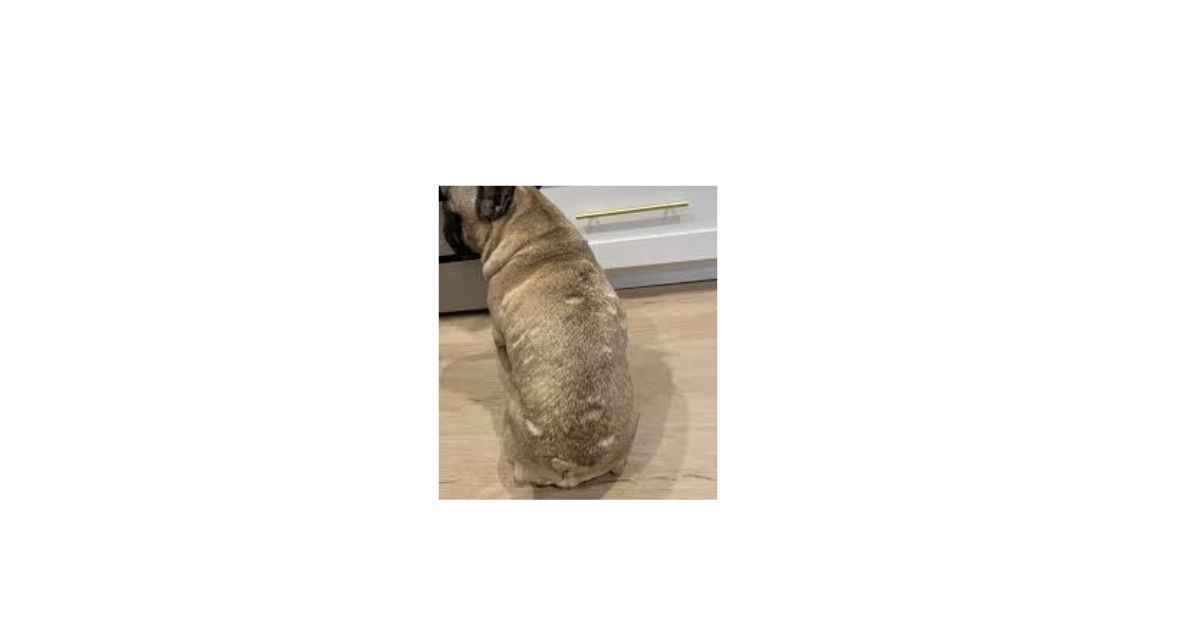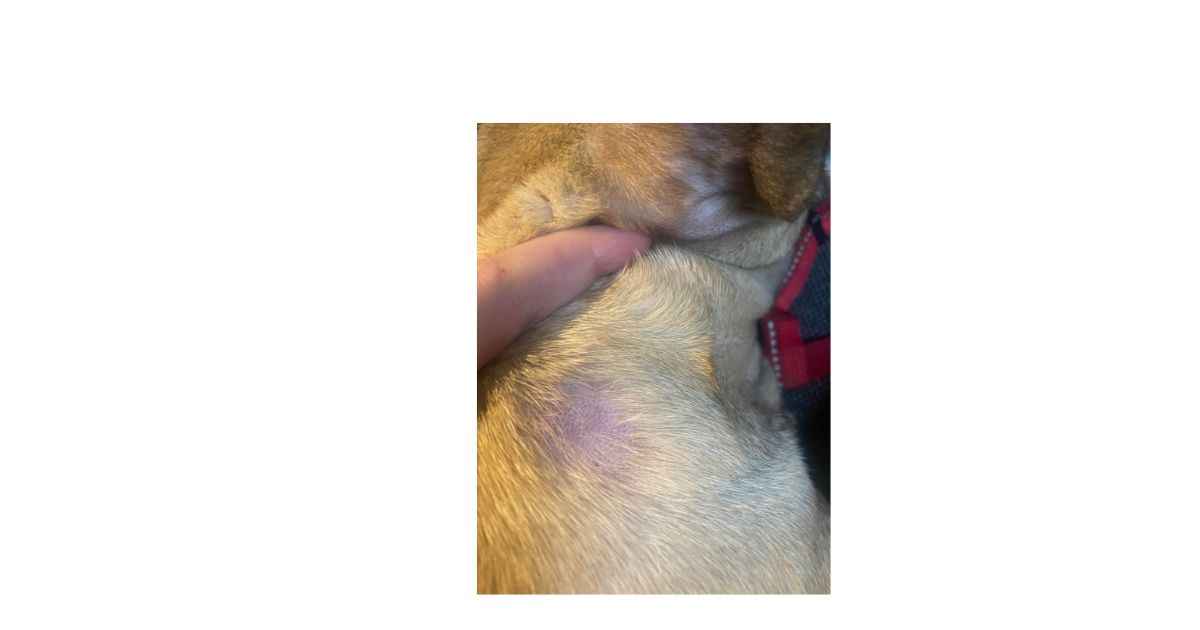I know you’re facing problems regarding French Bulldog hair loss, just like I did with my own French Bulldog. If you find hair loss around the ears and eyes of your French Bulldog, it may also be caused by some reason, i.e., allergies, skin infections, heart problems, or even pregnancy. After adopting action, you can keep your French Bulldog’s coat healthy and shiny.
Rest assured, you’re not alone in this. With the right tips, tricks, and treatments, you can effectively address the issue of French Bulldog hair loss. I’m here to provide the guidance you need to navigate this challenge and restore your pet’s health and happiness.

Common Causes of French Bulldog Hair Loss
There are some causes which are mentioned below in detail:-
Lack of Essential Nutrients
Providing your French Bulldog with a nutrient-rich diet is crucial in controlling hair loss and maintaining a healthy coat. Proper nutrition, including proteins, vitamins, and fatty acids, directly impacts your pet’s skin and coat health. By ensuring your pet’s diet is balanced and rich in these nutrients, you can play a significant role in their overall health and well-being.
Environmental Factors
Seasonal changes can lead to ‘seasonal flank alopecia,’ a type of hair loss in some dogs. This condition, which typically resolves within 3-4 months, results from environmental factors.
Reaction From Rabies Vaccines
The rabies vaccine is an injection given to dogs that helps them fight infection. Many Frenchies experienced hair loss at the injection site after receiving the rabies vaccine. They also faced hives, throat and mouth swelling, difficulty breathing, and blood pressure issues. Additionally, the vaccine can cause low fever, fatigue, coughing, sneezing, and vomiting.
Health Conditions
Many conditions cause hair loss; some are mentioned below:-
Allergies
Every owner has great love and affection for their pet, but as a human, a French bulldog can slo be affected by allergies, and there are several types of allergies mentioned below:-
1. Food allergies: (Beef, Dairy, Wheat, Chicken, Egg, Lamb, Fish, Rice, and Corn) If you experience a food allergy that causes hair loss in your French Bulldog, then change your food strategy like chicken alternate meat, meat alternate fish, etc.
2. Environmental Allergies: Compared to food allergies, there are many types of allergies in the environment like Dust & dust mites, Cockroaches, Mold Spores, Pollens, Grass, Weeds, Trees, Animal Dander and Indoor Plants
Note:
Food allergies are common in French bulldogs. If you have this issue, consult your vet immediately.
Alopecia
Alopecia is the loss of hair in patches or all over the body because the body attacks the hair follicles. This hair loss can be temporary or permanent and usually follows a pattern. It’s not dangerous, but it can make your dog irritating. Seasonal alopecia often happens in the fall and winter, with hair loss on the sides, chest, tail, nose, and ears. The hair normally grows back within six months.
Cushing’s disease
Cushing’s disease, also known as hyperadrenocorticism, is a condition in which a dog’s body produces too much of a hormone called cortisol. This hormone helps the body handle stress and control weight, blood sugar, and the immune system. However, too much cortisol can cause serious health problems.
Three types of Cushing’s disease are mentioned below with enough detail:
- Pituitary Gland Tumor: Now the most common type. It occurs when a tumor in the pituitary gland, located at the base of the brain, causes the body to produce more cortisol. Dogs with this condition may drink a lot of water, lose muscle, gain weight, and have thinning skin or hair loss. If the tumor grows, it can lead to brain problems, making the situation worse.
- Adrenal Gland Tumor: This type of tumor is caused by a tumor in the adrenal gland near the kidneys. If the tumor is not cancerous, surgery can usually cure the disease. But if the tumor is cancerous, the outlook is less positive, even though surgery might help for a while.
- Iatrogenic Cushing’s Disease: This form happens when a dog has been given too many steroids for another medical condition. While steroids can be helpful, too much can lead to harmful levels of cortisol in the body.
Cushing’s disease can be complex to diagnose because the symptoms, i.e., increased thirst and urination, can also look like normal aging. Treatment often involves surgery or medication, but it requires regular vet check-ups to keep the condition under control. Early detection and proper care are important for managing this disease.
Traction alopecia+

It can be caused by the rubber bands on Cannie’s head or the fashion accessories that remove the hair.
Skin Infection
There are many types of skin infections, but the five common ones are mentioned in enough detail:
- Skin Fold Dermatitis: This happens in the skin folds, causing redness and discomfort due to trapped moisture.
- Pyoderma: A bacterial infection in the skin folds, leading to red bumps and irritation.
- Hot Spots: Painful, inflamed areas that can spread quickly. I was shocked when it happened to my pet.
- Canine Acne: Pimples around the dog’s mouth.
- Contact Dermatitis: Skin irritation from allergens like detergents or plants.
Underlying Medical Conditions
French Bulldogs often have trouble breathing due to their short noses. This condition, called brachycephalic airway syndrome, results from their pushed-in noses, elongated soft palates, and narrow windpipes. To help them breathe better, especially in hot weather or during intense exercise, it’s best to keep them indoors.
Manage
Regarding French Bulldogs, hair loss can be caused by mange—a condition resulting from mites in their hair follicles. There are two types of mange: Demodex (localized to one spot) and Sarcoptes (more widespread). If your Frenchie experiences hair loss, consult your vet for proper diagnosis and treatment.
Bacterial and Fungal Infections
Dogs with itchy skin, flaky or moist patches, and redness may have fungal infections. Common issues include yeast dermatitis and staph infections. If your dog is uncomfortable, consult a vet for proper diagnosis and treatment.
Types of Fungal Infections:
- Fungi can affect the skin or invade the whole body.
- Systemic infections can be serious, impacting organs like the lungs and liver.
- Prompt treatment is crucial to prevent complications.
If you are facing any major problems, kindly visit your vet clinic.
Manage and Other Parasites
Three types of management (external parasite mites) are commonly found in dogs: 1. Sarcoptes mites cause sarcoptic mange.
2. Demodex mites cause demodectic mange.
3. Ear mites (Otodectes cynotis) cause otodectic mange.
You can also manage all types of hurdles if you love your pet.
Stress
This is the major problem of hair loss in your puppy. Don’t give stress to your pet in any condition.
Malnutrition
Lack of food is called malnutrition, so don’t do this act for your pet because he is your companion.
Fleas
If flees constantly sit in the relevant areas, it can cause hair loss.
Hormones
When it comes to French Bulldogs, keep an eye out for signs like excessive thirst, frequent urination, recurring vomiting or diarrhoea, and occasional weakness or depression. These symptoms often point to a hormone imbalance.
Nutritional deficiencies
To stay healthy, dogs need a balanced diet with carbohydrates, fats, proteins, vitamins, and minerals. Nutritional deficiencies can occur due to an imbalanced diet, disease, aging, or genetics.
Common deficiencies include:
- Protein: Lack of protein can lead to dry skin, wound healing, and muscle loss.
- Essential Fatty Acids: Deficiency results in dry skin, a dull coat, and increased shedding.
- Vitamins: For instance, vitamin C deficiency causes skin infections, while vitamin B12 deficiency leads to anemia.
- Seek Veterinary Care: If you suspect a deficiency, consult a vet immediately. Treatment may involve adjusting the diet, supplements, or medication.
Hypothyroidism in Dogs
Hypothyroidism in dogs occurs when the thyroid gland doesn’t produce enough thyroxine, affecting metabolism. It’s common in middle-aged dogs of medium to large breeds, including golden retrievers, Labrador retrievers, and Doberman pinschers. Neutered males and spayed females are at higher risk. Symptoms include weight gain, hair loss, and lethargy. Treatment remains consistent regardless of the cause.
Pressure Ulcer
Unlike human bed sores, pressure sores in dogs can occur due to excessive pressure on bony areas, often on the hips. Preventing them involves understanding early signs and taking measures to avoid prolonged pressure.
Breeds Susceptible to Alopecia
Certain dog breeds, like Bulldogs and Siberian Huskies, are prone to alopecia (hair loss). Proper care and breeding practices can help prevent this condition.
Autoimmune disorders
Autoimmune diseases occur when the immune system mistakenly targets the body’s proteins and cells instead of external threats. This immune response can harm tissues and organs, leading to various symptoms. While not an immediate emergency, untreated autoimmune diseases can have serious consequences, even fatal ones.
Symptoms to Watch For
As soon as you identify the problems, you can solve them earlier. Some common symptoms were mentioned:-
Visible Patches of Hair Loss

One sign of alopecia is visible patches of hair loss, which can differ in size and are also spotted on the body of your Frenchie. You must pay attention to solve these issues that can control hair loss.
Red, Inflamed, or Flaky Skin
The hair of your Frenchie is lost if your pet has red, inflamed, or flaky skin. Make necessary arrangements and cool down his body. Dry, flaky dog skin may indicate different problems, including allergies, mange, or skin diseases. However, in many cases, it’s not a cause for action. During winter, some dogs naturally experience dry skin.
Excessive Scratching or Licking
It is a common symptom that can occur when the flees are laying eggs or staying in the relevant spot. For this reason, further skin issues and hair loss can occur. It is important to note that you should easily remove and find the flees with the dog comb.
Behavioral Changes
It can be caused by skin issues or irritation, itching, or scratching due to hair loss.
Diagnosing Hair Loss in French Bulldogs
Determining the reason for hair loss is crucial for treatment.
Home Observation
When you’re checking your French Bulldog for hair loss, watch him for visible patches of missing fur and note where they are. Look at the skin in those areas—does it seem red, inflamed, or flaky? Also, watch for excessive scratching or licking.
And here’s a tip: Fleas can lay eggs on your pet, which might fall off and hatch in your home. To prevent fleas, consider replacing carpeting and keeping your living space dry.
Veterinary Examination
Physical examinations are essential for clinicians. They help detect minor issues early and identify major organ problems without costly tests. Consistency matters—examine thoroughly, record findings, and note unexamined areas. A vet visit is crucial for French bulldogs experiencing hair loss.
The examination includes assessing overall health, skin condition, hair follicles, and potential hormonal imbalances.
Hot spots
Hot spots mostly appear on the hip, neck, and under the ear of flaps, and they could have occurred in hot weather. If you find a major problem, contact your vet.
Infections causing bald patches
Yeast and bacteria commonly make a house on the body of your pet. Due to this, redness and itch were found on your French Bulldog. This reason is enough for hair loss.
Seasonal Flank Baldness
Seasonal flank Baldness is a type of alopecia, and it can occur due to the reason for gaining less sunlight. Usually, it happens in cold weather when you cannot go outside. Undoubtedly, French bulldogs are indoor pets, but the sunlight gives them vitamin D, which is most important for them.
Hormonal problems
Different harmonies affect French Bulldog hair growth; if homens reach a certain level, i.e., high or low, it could cause hair loss.
Acral lick dermatitis
Psychological factors often trigger acral lick dermatitis in French Bulldogs. When bored, stressed, or anxious, Frenchies may excessively lick their skin. The enzymes in their saliva can lead to localized dermatitis, which, over time, may cause hair shedding and baldness.
To stop hair loss and licking in your French Bulldog, consider using an Elizabethan collar, bandages, or a muzzle as a physical barrier.
Poor dogs nutrition/nutrition for dogs
Poor nutrition is also the result of shedding.
Effective Solutions for Hair Loss
There are some solutions to control and prevent hair loss of your companion.
Dietary Changes
If you find any problem with your pet’s hair, decrease the food routine. Start by feeding 75% of the previous diet and 25% of the latest.
Medical Treatments
If major issues are involved, then contact your vet.
Grooming Practices
Brush your vet regularly to remove hair from your pet’s body. You must also bathe your pet during hair loss as your vet prescribes.
When to Seek Professional Help
If you find serious problems, then contact your vet.
Why Do French Bulldogs Lose Their Hair?
French Bulldogs lose their hair due to allergies, parasites, infections, genetic predispositions, hormonal imbalances, poor nutrition, stress, or skin trauma. Identifying the underlying cause often requires a veterinarian’s assessment to ensure appropriate treatment and care.
Why Frenchies lose their hair by shedding
French Bulldogs, often called Frenchies, shed their hair as part of their natural hair cycle, especially during seasonal changes. Regular brushing can help manage this shedding. However, if a Frenchie loses a lot of hair, it might be due to allergies or other health problems, so a vet visit is important.
French bulldogs with hair loss behind ears
Hair loss behind the ears in French Bulldogs can be caused by several factors, such as allergies, parasites, infections, or hormonal imbalances. Regular grooming and a balanced diet can help reduce the risk. If the hair loss is persistent or severe, it’s important to consult a veterinarian for proper diagnosis and treatment.
Hair loss around eyes
Various factors, including allergies, mites, infections, or underlying health issues, can cause hair loss around a French Bulldog’s eyes. It’s important to monitor for additional symptoms like itching, redness, or discharge. Consult a veterinarian for accurate diagnosis and treatment to ensure your pet’s health and well-being.
French Bulldog losing hair after pregnancy.
It’s common for French Bulldogs to experience hair loss after pregnancy due to hormonal changes and the physical stress of childbirth. This condition, often called postpartum alopecia, typically resolves on its own over time. Ensuring a nutritious diet and proper grooming can support recovery. However, if hair loss persists or seems severe, a veterinary consultation is advisable to rule out any underlying health issues.
How to spot alopecia in French bulldogs?
To spot alopecia in French bulldogs, look for thinning fur, bald patches, or excessive shedding. The skin in these areas may be red or irritated. Pay attention if your dog frequently scratches or licks the spots. Alopecia can be caused by allergies, hormones, or parasites, so consult a vet for diagnosis.
Conclusion
In this article, I have explained French bulldog hair loss in detail and how to solve it. After reading the full article, you can solve the issue properly. If you still cannot resolve the problem, immediately contact your vet.